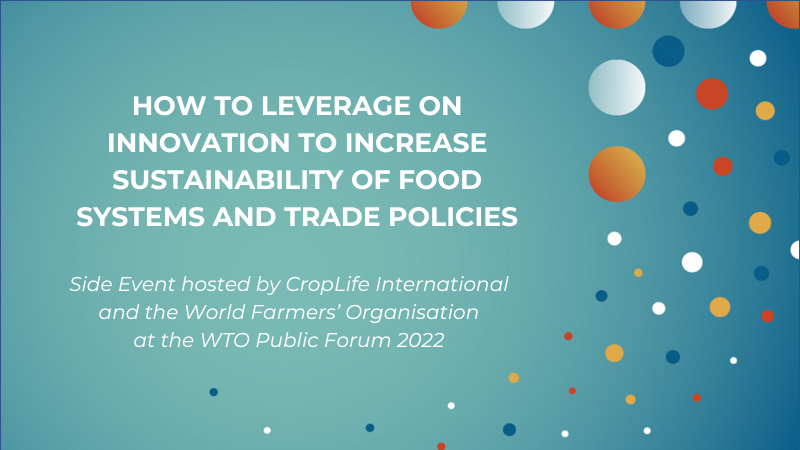Today, September 27, within the framework of the WTO Public Forum 2022, the World Farmers’ Organisation (WFO) co-hosted, together with CropLife International (CLI), the working session “How to Leverage on Innovation to Increase Sustainability of Food Systems and Trade Policies”.
Feeding and caring for a growing global population affected by chronic hunger, malnutrition, structural inequalities, ongoing conflict, and economic and health crisis, all while dealing with climate change and other environmental challenges, impacting how our food is produced, traded, and consumed, requires diverse, resilient, inclusive, and sustainable food systems. Agricultural innovation and technologies, including digital value chain solutions, are key drivers to increasing sustainability in the three dimensions: economic, environmental and social.
In this context, the session reflected and explored how innovation including the use of modern technologies in agriculture and a broader digitalization of the value chain can accelerate the transition to more sustainable food systems and predictable, transparent and inclusive trade policies.
Moderated by Ms Doaa Abdel-Motaal, Author & Senior Counsellor at the World Trade Organization (WTO) Agriculture and Commodities Division, the working session featured the participation of the WFO President Mr Arnold Puech d’Alissac, Ms Giulia Di Tommaso, President and CEO of CropLife International (CLI), Mr Michael Keller, Secretary General of the International Seed Federation (ISF), Dr Carlo Fadda, Research Director at Alliance of Bioversity and CIAT – Biodiversity for Food and Agriculture.
All the panellists brought into the debate their perspectives on how trade policy can support innovation for the sustainability of food systems and innovatively strengthen global agricultural value chains to make them more resilient to the multiple crises we have on our hands.
WFO President Arnold Puech d’Alissac started the debate by underlying that, for farmers, the challenge is to fight climate change while maintaining or increasing productivity. This challenge is also accompanied by the ones on prices: “while the costs of production are on the rise, we must make sure that farmers get a fair price for the products.”
“The Food Systems Summit helped to recognise that it is all about local solutions, and farmers’ solutions, and we need to put farmers at the centre. We are all part of the same value chain,” – echoed ISF Secretary General Michael Keller.
Jumping into the core theme of this WTO Public Forum working session – innovation in agriculture – Giulia Di Tommaso, CLI President and CEO, stated that “in CropLife, we believe that innovation in agriculture is key as well as the multistakeholder approach to Increase Sustainability of food systems.”
“To innovate farming systems in an economically sustainable way, that make farming a business” – said Dr Carlo Fadda – “we need for sure technical innovations, but also innovation in value chains and research has a big role to play”.
He also remarked that one of the crucial commitments of agricultural innovation is giving farmers the tools to be able to effectively use those innovations.
WFO President also pointed out that trade pushes farmers to be more efficient and competitive as competition grows with global value chains. For that reason, “innovation in trade should help farmers in this path of becoming more efficient and increasing the sustainability of their farms while staying competitive.”
Following his reasoning, Ms Tommaso added that trade policies should enhance the deployment of innovation in agriculture and help reach the farmers and not be an obstacle.
Mr Keller, speaking from the private seed sector, closed his speech by highlighting that ISF‘s main goal is to give farmers seed choices, “but we need an enabling regulatory framework to do it, including trade policies”.
At the end of the session, the moderator highlighted that there are still many questions to be addressed and answered related to our capacity to enable the shift towards sustainable food systems and trade policies that we want and that the panel made it clear that there is a real commitment and willingness to continue working hard to make it happen.
